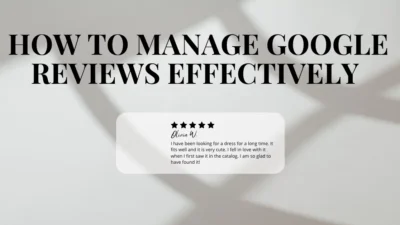Your online reputation matters more than you think. Whether you’re an individual professional, a small business owner, or part of a large enterprise, what people see when they search your name or your brand online can shape public perception, influence decisions, and even impact your livelihood.
But how do you find out exactly what your online reputation looks like? This guide will walk you through how to check your online reputation step by step, identify tools to simplify the process, and offer tips for maintaining a positive online presence.
Why Monitoring Your Online Reputation is Crucial
Your online reputation is like a digital first impression. A single negative review, outdated profile photo, or misinformation can create a narrative that’s tough to change.
Here’s why keeping tabs is essential:
-
Influence on decisions: 93% of consumers read reviews before making a purchase, according to a BrightLocal survey.
-
Professional opportunities: Employers, collaborators, and clients routinely search for individuals and companies online.
-
Crisis prevention: By monitoring your reputation, you can catch and address issues before they snowball into serious problems.
Staying proactive about your online presence ensures you’re in control of your narrative rather than letting others shape it for you.
Step-by-Step Guide to Checking Your Online Reputation
Step 1: Search Your Name or Business on Google
This is the easiest and most direct way to start. Type your name, your business name, or relevant keywords into Google. Explore the first two or three pages of search results.
Look out for:
- Search results from websites that mention your name or business.
- News articles, blog posts, or forums discussing you.
- Online reviews, such as those on Yelp, Google Reviews, or Glassdoor.
- Social media links, profiles, or hashtags associated with you.
Pro Tip: Search in private or incognito mode to see unbiased results unaffected by your past browsing.
Step 2: Review Social Media Accounts
Your social media activity plays a significant role in shaping your online footprint. Check your public posts, interactions, old tweets, and tagged photos across all platforms, including LinkedIn, Facebook, Instagram, and Twitter/X.
Ask yourself:
- Does every profile represent you or your brand in a professional, on-brand way?
- Are there any posts that could be considered controversial or inappropriate?
If you’re a business, check if your followers have posted reviews or feedback on your page.
Step 3: Use Online Reputation Tools
Several tools can automate and simplify the process of tracking your online reputation. Here are a few popular ones:
-
Google Alerts: Set up alerts for key terms like your name, your business name, or branded hashtags. You’ll get email notifications whenever new content mentioning those terms appears online.
-
Brand24: This tool monitors mentions of your brand or keywords across social media, blogs, forums, and more.
-
Reputology: Specifically designed for monitoring reviews, this tool focuses on platforms like Yelp and Google Reviews.
-
Mention: Tracks your online mentions across various platforms and helps assess the sentiment of those mentions.
Step 4: Check Online Review Platforms
For businesses, reviews are everything. Visit sites like:
- Google Reviews
- Yelp
- Trustpilot
- TripAdvisor (for travel/hospitality industries)
Take time to read and analyze patterns in your reviews. Customer sentiment often reveals insights about service quality and areas for improvement within your business.
Step 5: Evaluate Search Engine Optimization (SEO) Results
SEO data reveals what users find when they search for your products or services. Audit your business’s website and branded keywords using SEO tools like Moz, Semrush, or Ahrefs to see which pages rank higher.
What to look for:
- Is your website showing up high enough in search results?
- Are negative or outdated links ranking higher than positive ones?
Proper SEO management can push harmful content lower down in search rankings, limiting its visibility.
Step 6: Analyze Brand Mentions and Sentiment
How are people talking about you or your brand? Tools like Hootsuite Insights or Sprout Social allow you to monitor conversations and sentiment surrounding your digital footprint.
Sentiment analysis categorizes mentions as positive, neutral, or negative. If you spot a pattern of negative feedback, dig into specific complaints to identify trends.
What to Do After Checking Your Online Reputation
Addressing Negative Content
-
Respond Professionally: If you spot a negative review or comment, respond politely, acknowledge the feedback, and offer a resolution when possible.
-
Request Removal When Justified: For malicious or false information, request the content’s removal from the platform or escalate it through Google’s content removal tool.
-
Suppress with Positive Content: Create fresh, positive content to rank higher on search engines and push down outdated or harmful results.
Strengthening Your Digital Presence
-
Update All Online Profiles
Ensure your LinkedIn, business website, and all social media platforms are current and professional. Consistency builds credibility. -
Implement an SEO Strategy
Publishing blog posts, case studies, or thought leadership pieces can bolster your personal brand or business SEO. -
Encourage Reviews
Ask happy customers or colleagues to leave positive reviews. New reviews dilute the impact of negative ones while emphasizing the positive feedback. -
Engage with Your Audience
Staying active across social media ensures that your audience sees you as responsive and approachable. Regular posts also allow you to steer your online narrative.
Keep Your Reputation Positive
Your online reputation isn’t static. It evolves with your business, career, and activities. By consistently monitoring, responding to feedback, and improving your digital presence, you’ll ensure it aligns with how you want to be viewed.
If you don’t know where to start or need professional guidance, consider consulting experts in online reputation management. They’ll help you take charge of your digital footprint and keep you ahead of the competition.
Learn more About: Online Reputation Management for Your Business





